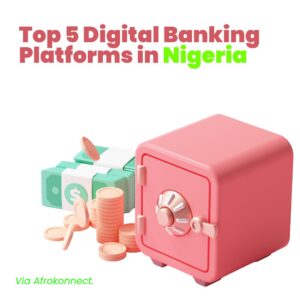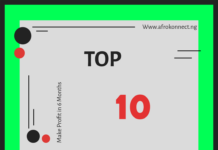
What sets Nigeria apart is the rapid adoption of digital banking solutions by a young, mobile-first population in combination with strong fintech innovation and increasing regulatory support. These factors have collectively created an environment where digital-only banks and online financial platforms are not just alternatives — they are becoming the primary way millions of Nigerians access financial services.
In this post, we will explore the top five digital banking platforms in Nigeria that are leading this financial revolution. We’ll examine what makes them stand out, how they serve the needs of consumers and businesses, and their broader impact on Nigeria’s evolving financial ecosystem.
Top 5 Digital Banking Platforms in Nigeria
1. Kuda Bank
Often referred to as “the bank of the free,” Kuda is arguably Nigeria’s most well-known and widely used digital banking platform. Launched in 2019, Kuda operates as a mobile-only bank and has secured a full microfinance banking license from the Central Bank of Nigeria, allowing it to provide core banking services directly.
Kuda’s appeal lies in its user-friendly interface and its cost-saving value proposition. It offers zero card maintenance fees, free transfers within the Nigerian banking system (up to a certain limit), and no minimum balance requirements. Users can open accounts in minutes using just their smartphone and government-issued ID, making it highly accessible — especially to first-time banking customers.
Beyond basic banking services, Kuda has integrated features such as smart budgeting, automatic savings, and spending insights, which encourage better financial habits among young Nigerians. Its sleek mobile app, fast transaction processing, and customer-focused design have helped Kuda secure millions of users and significant investor backing.
Kuda has not only disrupted Nigeria’s retail banking space but also redefined what convenience means in a digital-first environment.
2. Opay | Best Digital Bank in Nigeria
Originally launched in Nigeria by the Chinese-backed Opera Group, Opay started as a payments platform but has since evolved into a full-fledged digital finance ecosystem. Its banking services are provided through a licensed microfinance structure, and its mobile wallet is among the most widely used in the country.
What makes Opay stand out is its deep integration with everyday consumer needs. Beyond mobile banking, the platform allows users to pay for airtime, utility bills, transportation, and food delivery. This multifunctional approach has made it immensely popular among urban dwellers looking for convenience in both finance and lifestyle.
Opay’s banking features include instant account creation, high transaction speed, low fees, and cash rewards for certain usage milestones. It also supports merchant tools, making it easier for small businesses and informal vendors to accept digital payments — an important feature in Nigeria’s largely cash-dependent economy.
By combining digital banking with a lifestyle platform, Opay has become more than a financial tool. It’s a digital companion for everyday living, especially in major cities like Lagos and Abuja.
3. V Bank
V Bank is a product of VFD Microfinance Bank, and it has positioned itself as a stylish, efficient, and customer-focused digital banking solution for the Nigerian market. Launched in 2020, V Bank quickly gained traction by targeting Nigeria’s tech-savvy youth and offering a full suite of banking services directly through a mobile app.
The bank allows users to open an account in under two minutes without paperwork, provides virtual debit cards for online transactions, and supports peer-to-peer transfers, savings goals, and bill payments. V Bank emphasizes customer service, with in-app support and relationship managers who can be contacted directly via chat.
One of the notable features of V Bank is its community-based engagement. It offers referral rewards, personal financial management tools, and flexible savings plans that appeal to millennials and Gen Z users. V Bank also aims to support entrepreneurs by offering business banking features that don’t require a physical branch presence.
In an increasingly competitive digital banking landscape, V Bank’s strength lies in its sleek user experience, customer incentives, and proactive approach to consumer engagement.
4. ALAT by Wema
Launched in 2017, ALAT is widely regarded as Nigeria’s first fully digital bank. It is an initiative of Wema Bank, one of the country’s oldest financial institutions, and it marked a bold move to modernize banking through a mobile-first experience.
What distinguishes ALAT is its seamless blend of digital innovation with the trust and stability of a traditional bank. Users can open and fund an account entirely online, access savings and loan products, and even request physical debit cards delivered to their homes — all without visiting a branch.
The platform is especially popular for its goal-oriented savings tools. Users can set up automated savings plans with customizable goals and receive interest rates that are often more competitive than those of traditional savings accounts. ALAT also provides digital loans, allowing qualified users to borrow funds within minutes without extensive paperwork.
By bridging the gap between conventional banking and digital accessibility, ALAT has maintained its relevance in a market increasingly dominated by fintech newcomers. Its consistent product updates, user education efforts, and integration with Wema Bank’s core services make it a trusted choice among digital-first consumers.
5. Rubies Bank | Best Digital Bank in Nigeria
Rubies Bank is another fast-rising digital-only bank in Nigeria, offering a highly personalized and flexible banking experience. Unlike many traditional or even digital banks, Rubies gives users the ability to choose their own account number, create virtual dollar cards, and manage multiple wallets within a single app.
Launched with the mission of redefining personal banking, Rubies has taken a bold approach in offering tools that cater to both individual users and small businesses. It offers account features like sub-accounts, joint accounts, and instant settlement for merchants. Users can perform routine banking functions, request loans, pay bills, and even participate in savings challenges through the app.
A unique aspect of Rubies is its banking referral system, which allows users to act as “banking agents” and earn a commission for onboarding others — a feature that has helped spread its reach in less-served communities.
Rubies’ focus on customization, transparency in pricing, and innovative financial tools reflects a deeper understanding of the diverse financial needs within Nigeria. While still growing, its forward-thinking model makes it one of the most exciting platforms to watch in the space.
RECOMMENDED:
Conclusion about the Top 5 Digital Banking Platforms in Nigeria

The rise of digital banking platforms in Nigeria is more than a technological trend — it is a socio-economic shift that is redefining access to finance for millions. These platforms are not only improving convenience but also enhancing financial inclusion, particularly for the unbanked and underbanked populations.
From Kuda’s user-first model and Opay’s multifunctional ecosystem to ALAT’s pioneering role and Rubies’ customization features, each platform reflects a different facet of Nigeria’s digital banking evolution. Together, they represent a broader movement toward a more accessible, efficient, and user-driven financial system.
While challenges such as infrastructure limitations, cybersecurity concerns, and regulatory alignment remain, the progress so far signals a promising future. As smartphone adoption increases and digital literacy improves, these platforms are likely to expand their impact even further — not just within Nigeria, but as models for digital banking across Africa and other emerging markets.
Thank you for reading this post. If this post helped you understand Nigeria’s digital banking space better, please consider liking, sharing, or subscribing for more in-depth explorations of finance, technology, and innovation across the globe. On that note, this brings us to the end of this post about the Top 5 Digital Banking Platforms in Nigeria, via Afrokonnect.















